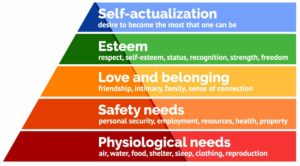I have been thinking about how our current covid-heavy situation might be affecting our motivation and willpower lately and my research led me to Maslow’s Hierarchy of Needs.

Now, this may sound dry but stick with me for a minute.
This is how the hierarchy goes, in order from most important to least important (remember, this is in “the survival of the species” terms).
- Biological and physiological needs – food, drink, shelter, warmth, sleep, air.
- Safety needs – protection, security, order, law, stability.
- Love and Belongingness – family, affection, relationships
- Esteem (cognitive, aesthetics) – achievement, status, responsibility, reputation
- Self-actualization – personal growth and fulfillment
- Transcendence – Helping others (this was a later addition to the hierarchy)
If we are striving to maintain motivation for some of the higher needs on Maslow’s scale, like “Self-actualization” (personal growth and fulfillment), but – for perhaps the first time in our lives – we are faced with the possibility of our “physiological” or “safety” needs not being met, well isn’t it totally understandable that our motivation for self-improvement takes a backseat? Or gets the boot altogether?
Here’s an example: you want to learn how to do a pull-up properly so you resolve to exercise for at least 30 minutes each evening after dinner. Great! But instead, you find yourself reading social media posts about how the food supply in your nation is deeply flawed or obsessing about how your retirement savings have taken a hit during the current financial downturn.
By nature of our own instinct for survival, the motivation to get strong enough to do a pull-up is replaced by worry about safety and security.
This is the problem with relying too heavily on motivation. And I mean any time In hIstory, not just during a global pandemic.
In the Weighless approach, (unlike in most diets or exercise programs) we take the focus off of motivation and willpower and instead build systems that can withstand stress and uncertainty. We focus on paying attention to the thoughts and the feelings that drive our choices and actions. Are they true? Are they meaningful? What other choices do we have that are rooted in reality (not just in fear)?
By doing this we can circumvent motivation and achieve our goals, even during stressful times.
Motivation can certainly help you survive but it is unlikely to help you thrive.
